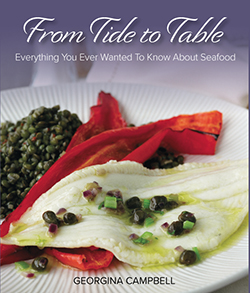Georgina Campbell's Cookery Feature - Celebrating the Classics
 As new places open, food fashions come and go, and new products flood the market, the pages of the Irish food story are turning with ever increasing speed - and, while the phenomenon is quite rightly a point of great pride, it also tends to make us look back and reassess the value of what has gone before.
As new places open, food fashions come and go, and new products flood the market, the pages of the Irish food story are turning with ever increasing speed - and, while the phenomenon is quite rightly a point of great pride, it also tends to make us look back and reassess the value of what has gone before.
More and more often I find myself actively appreciating the foods, people and businesses that have laid the foundation for the good things we enjoy today. It’s a feeling that is increasingly reflected in our annual Awards, and it seems to be becoming a trend - it was a strong theme at the inaugural Food On The Edge Symposium in Galway last month, for example, which may have surprised delegates who were expecting it to be all about the future.
Where would we be without all those dedicated producers, hoteliers, restaurateurs and chefs who have been there for the long haul. A place like the fifth generation Hunter’s Hotel, in Co Wicklow, for example, is a pearl beyond price and every visit is a joy; nothing ever changes, thank goodness, and they just get on quietly doing the job pretty much as it has always been done.
Throughout Ireland there are countless places with a similar philosophy and we need to treasure them. Some have been celebrating special anniversaries this year - having opened in 1950, Beaufield Mews is an amazing 65, and, while not many can challenge that, there are lots of lovely places that have been around a long time and survived the recession. Ely and Pearl Brasserie have both made unique contributions to Dublin’s restaurant scene for fifteen years, for example, and Rinuccini has made Kilkenny a more exciting dining destination for a quarter of a century.
These and others like them also take enormous pride in cooking the wonderful ingredients that we are so lucky to have in Ireland, often in the classical and traditional - or updated traditional - dishes that never go out of style. Here are just a few to try.
RECIPES: Macreddin Village Duck Liver Parfait
You wouldn’t think so from his youthful demeanour (a trait shared with Patrick Guilbaud) but Evan Doyle’s restaurant at BrookLodge, The Strawberry Tree - which is still Ireland’s only certified organic restaurant - predates the hotel’s 1999 opening by a good few years, going back to its origins in Killarney in the’80s.
Evan’s contribution to Irish food, and that of the team he has built around him, is extraordinary. The wild, seasonal and organic philosophy has held true from the start, and was decades ahead of the current trend. Everything to do with food and drink at BrookLodge is a unique combination of respect for tradition and openness to the future.
A regular treat in the hotel’s lovely Orchard Café, this gorgeous parfait combines tradition, simplicity and attention to detail. “A full fat, creamy and silky smooth Parfait, that’s just perfect to spread over the sweetness of a hot toasted brioche. Accompany it with the tartness of some wild Crab Apple Jelly or Rose Hip Jelly, a handful of baby leaves from Richard Mee’s or Denis Healy’s farms and now you’re ready to invite your friends round for a special lunch… that they will remember!”
400g fresh organic duck livers, sinews removed
500ml organic milk
100ml Orchard Café homemade wine or Madeira
100ml port
60g shallots finely chopped
2 sprigs of thyme
1 garlic clove, peeled and crushed
50ml cognac
5 organic eggs
400g unsalted butter, melted
organic black pepper, Achill Island sea salt
Soak the livers in the milk and add 500ml water with 2tsp salt in a shallow dish for one hour. Rinse & drain well.
Put the wine, port, shallots, thyme, garlic & cognac in a saucepan, bring to the boil and reduce by one-third.
Place the livers and the contents of the pan in a food processor and blitz, adding the eggs one at a time until the texture is silky smooth. Gradually add the melted butter and season. Line a terrine tin, with greaseproof paper or cling film.
Pass the mixture through a sieve into a large bowl and then pour into the terrine tin, cover with greaseproof.
Place the terrine in a deep baking tray and pour boiling water until it reaches two-thirds of the way up the side of the terrine tin. Place the tray in a preheated oven at 130’C and cook for 50 to 60 minutes.
When the parfait is cooked, remove the terrine tin & leave to cool for about 30 minutes. Place in a fridge overnight.
To Serve: Dip the terrine tin into a tray of boiling water to loosen the parfait. Then tip-over the parfait onto a suitable plate and slice with a hot knife. Serve with toasted brioche, seasonal leaves and a tart fruit jelly.
 Kerry Lamb Pie
Kerry Lamb Pie
A favourite Ballsbridge destination since 1992, Roly’s Bistro always had upbeat traditional food at its heart, something we were reminded of this summer, when they held a dinner “celebrating the best of Roly’s Classics - from its famous Kerry Lamb Pie, the delicious Dublin Bay Prawn Cocktail, the firm favourite Fish & Chips, to the stunning array of excellent meats and fresh seafood…”.
And, adapted from the cookbook Roly’s Bistro, The Restaurant and Its Food (Gill & Macmillan), this is their very modern take on the traditional Kerry pie. It may be light years away from the original that inspired it, but it’s very tasty nonetheless and is more appealing to today’s diner.
Kerry lamb pies – or, more particularly, Dingle Pies – were modest little mutton pies, not unlike Cornish pasties; the shortcrust pastry was made with mutton fat and the pies were often boiled in mutton stock, rather like dumplings.
Although you will still occasionally find something in the spirit of the original (at Dingle Cookery School, for example, where Traditional Irish Cookery classes are regularly held), today’s modern versions are, like the Roly’s pie, lighter - and probably more palatable too.
The filling for these pies could be made ahead and cooled, leaving only the pastry and oven baking to finish before serving.
Serves 4
10 button mushrooms
2 onions
2 carrots
4 sticks celery
750g/1 lb 9oz diced leg of lamb
1 dessertspoon tomato purée
700 ml/1¼pt good chicken stock
1 teaspoon gravy browning
200ml /7 floz white wine
bouquet garni
4 saucer-sized discs puff pastry, to cover four oven-proof soup bowls
15g / ½oz butter
1 large or two small parsnips, diced and broasted in butter
1 egg, beaten
Salt and freshly-ground black pepper
Cut mushrooms in half and sauté in a little oil for about 10 minutes.
Prepare the vegetables and chop into chunky pieces.
Seal the lamb in a hot saucepan with a little oil, and then season with salt and pepper and cook gently for 4-5 minutes. Add the onion, carrot and celery and cook with the lamb for a further 5 minutes.
Add tomato purée and cook for a further 2-3 minutes, then pour in the chicken stock, gravy browning and white wine. Bring to the boil and simmer gently for about an hour until tender.
Towards the end of the cooking time, add the bouquet garni and the cooked button mushrooms.
Pre-heat the oven to 200°C/400°F/Gas 6.
Roll out the pastry discs, making them slightly bigger than serving bowl.
Pan-fry the parsnips in some butter until tender. Ladle the lamb pie filling into the bowls, top with parsnips and cover with the pastry.
Brush with beaten egg and bake for 20 minutes, until pastry is golden brown. Serve immediately, with seasonal vegetables on the side.
 The Mustard Seed Porter Cake
The Mustard Seed Porter Cake
Dan Mullane’s beautiful Co Limerick country house and restaurant, The Mustard Seed, has wowed admiring guests for thirty years. It started out as a restaurant in nearby Adare in 1985, then moved to its present home at Echo Lodge in Ballingarry ten years later.
Like all the best places, the secret of its success lies in the combination of things that stay the same - the genuine hospitality, comfort, commitment to using the best local foods in season - and constant improvement which, in this case, includes exceptional dedication to the gardens, both ornamental and productive.
The cooking at The Mustard Seed is modern Irish, but there are plenty of traditional treats too, including some delicious breakfast specialities and great baking - like this porter cake, which is served on arrival to guests staying overnight, or as ‘an afternoon indulgence’. Porter is a lighter form of stout that was once very popular, but bottled stout does very well as an alternative in baking.
Makes one 8 inch / 20cm cake
1 lb/450g white flour
1 pinch of salt
1 tsp baking powder
8oz/225g soft brown sugar
½ tsp nutmeg, freshly grated
½ tsp mixed spice
8oz/225g butter, diced
8oz/225g sultanas
8oz/ 225g currants
2oz/50g chopped candied peel
2oz /50g crystallised cherries
1/2 pint / 300ml stout (eg Guinness)
2 medium eggs, lightly beaten
Preheat a moderate oven, 350°F / 180°C / gas mark 4.
Line the base and sides of a deep 8-inch / 20 cm cake tin with baking parchment.
Sieve the flour, salt and baking powder into a bowl. Add the sugar, nutmeg and spices. Rub in the butter (by hand, or with a mixer).
Add the fruit. Combine the stout and beaten egg, then pour into the cake mixture and mix well.
Turn into the lined tin and bake in the preheated oven for about 2½ hours, or until the cake is nicely browned and feels springy to the touch.
Cool in the tin, then remove the baking parchment and store in an airtight container to use as required.






There are currently no comments
Leave a comment
Not a member? Register for your free membership now!
Or leave a comment by logging in with: